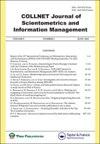Bibliometric measures in social sciences and humanities from different sources based on Brazilian data
IF 0.8
Q2 INFORMATION SCIENCE & LIBRARY SCIENCE
COLLNET Journal of Scientometrics and Information Management
Pub Date : 2022-07-03
DOI:10.1080/09737766.2022.2097896
引用次数: 1
Abstract
The objective of this paper was to determine what type of information is available for journal article production from different sources, especially for Brazilian researchers in the areas of humanities (H) and social sciences (SS), and Letters, Literature and Arts (LLA). This paper looks at the various dimensions of the SS, H, and LLA impact using data from four databases (InCites based on Web of Science/Carivate Analytics, SciVal based on Scopus/Elsevier, Scielo and Redalyc). The four databases show low overlap. A large proportion of Brazilian papers in Incites and Scival are published in a low percentage of journals in these databases, with a high percentage of journals having a few papers each. SS, H and LLA have fewer papers per journal, fewer authors per paper and LLA cite fewer papers than the other areas of knowledge. They also take longer to accumulate citations, and the behaviour of citations in Scielo differs from those in Incites and SciVal. The largest number of downloads of Brazilian papers from Redalyc is from the USA. Different databases show different citation patterns and impacts. The quantity and quality of production of Brazilian science in SSH areas are improving and can show high-impact research and prominence worldwide. Nevertheless, relevant themes for Brazil may not have the same importance internationally. Therefore, evaluation in these areas should not be limited to international databases. Recognising these differences does not imply negative conclusions regarding the international insertion of Brazilian human and social sciences.基于巴西数据的不同来源的社会科学和人文学科的文献计量方法
本文的目的是确定从不同来源的期刊文章生产可获得的信息类型,特别是对于人文(H)和社会科学(SS)以及文学、文学和艺术(LLA)领域的巴西研究人员。本文使用来自四个数据库(InCites基于Web of Science/Carivate Analytics, SciVal基于Scopus/Elsevier, Scielo和Redalyc)的数据来研究SS、H和LLA影响的各个维度。这四个数据库的重叠程度很低。在Incites和Scival上发表的大部分巴西论文发表在这些数据库中所占比例很低的期刊上,而在每个期刊上发表几篇论文的期刊所占比例很高。与其他知识领域相比,SS、H和LLA每期期刊的论文较少,每篇论文的作者较少,LLA引用的论文较少。他们也需要更长的时间来积累引用,并且Scielo中的引用行为不同于Incites和SciVal。从Redalyc下载巴西论文最多的是美国。不同的数据库表现出不同的引用模式和影响。巴西科学成果在SSH领域的数量和质量正在提高,可以在世界范围内展示高影响力的研究和突出地位。然而,巴西的相关主题在国际上可能没有同样的重要性。因此,这些领域的评价不应局限于国际数据基。认识到这些差异并不意味着对巴西人文和社会科学在国际上的插入作出否定的结论。
本文章由计算机程序翻译,如有差异,请以英文原文为准。
求助全文
约1分钟内获得全文
求助全文
来源期刊

COLLNET Journal of Scientometrics and Information Management
INFORMATION SCIENCE & LIBRARY SCIENCE-
自引率
0.00%
发文量
11
 求助内容:
求助内容: 应助结果提醒方式:
应助结果提醒方式:


